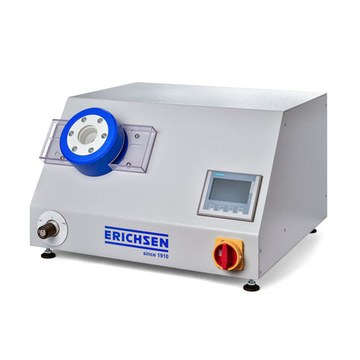Sheet Metal Testing Machines
The quality control and assurance has over the last decades increasingly gained importance and is one of the most important tasks in all areas of industrial production. For almost 100 years a test method to determine the level of quality of sheet metal exists. Abraham M. Erichsen is considered the inventor of the cupping test and he patented this test method in the early 20th Century. Meanwhile, the cupping test is adopted by the International Standards Organization (ISO) and therefore valid worldwide in all industrial applications.
Another coup of Mr. Erichsen was the development of a special tool for deep-drawing cup test in 1932. Without this testing procedure the series production of hollow bodies made of sheet metal would hardly be possible up to the present day. Feature of the method: to punch out round disks from sheet metal strip and then use it to shape it with a drawing die to a cup. In this way, the quality characteristic “formability of sheet metal” is of great importance in current productions.
Over the years, more test methods and rules which determine the properties and characteristics of sheet metal were added. In the course of changing materials and increasingly complex manufacturing processes, the requirements for the test methods got more challenging. Still the fast, reproducible and reliable material characterization is the center of attention. Besides the process- and quality control it is essential for the research and development of components and tools.

Special Testing
Hot Drawing Equipment up to 700 °C
Sheet metal testing, hot deep drawing tests up to 700 °C, deformation curves, Nakajima or Marziniak tests, FLC/FLD

Special Testing
Ear Measuring Instrument Model 126 Plus
Ear measuring instrument, for cups of 15 – 50 mm diameter, max. 100 mm cup height

Special Testing
Bulge-/FLC-Tester Model 161
Bulge/FLC tester, bulge and FLC tests, up to 1000 kN tensile force







